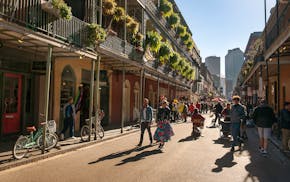Caroline Fraser has pulled a major switcheroo with her new book, "Murderland."
Fraser's last book, "Prairie Fires: The American Dreams of Laura Ingalls Wilder," won a Pulitzer Prize for its portrait of the folksy writer and her daughter, whom Fraser demonstrated was heavily involved in her mom's writing. But, whatever else he may have done, Pa Ingalls never ripped off anyone's face or assaulted them with a crowbar.
That's just the start for the people in "Murderland," including Ted Bundy, the Green River killer and others. A surprising number of them, it turns out, plied their trade in the Pacific Northwest — and, specifically, near Tacoma, Wash.
That's also where Fraser grew up. She thinks the area was so packed with killers in the '70s and '80s because of a copper smelting plant that belched lead, arsenic and other chemicals into the water and air. There is scientific evidence to indicate that those metals can deform brains, but Fraser mostly doesn't offer the evidence in "Murderland." Instead, she lays out harsh facts, in prose that is indignant and even angry, toting up such a profusion of horrible crimes (homicidal and environmental) that some readers may cry "uncle."
In short, sharp segments, Fraser details hundreds of gruesome crimes. She also recounts Tacoma citizens (as well as residents of other smelter-adjacent areas) who died of painful diseases related to pollution. Less germanely, she describes numerous violent accidents on a badly built bridge that connected Seattle to nearby Mercer Island and that Fraser believes is indicative of a lack of regard for human life.
As the title helpfully warns, "Murderland" is not for the faint of heart. The crimes are so nasty and there are so many of them that you may need to keep a Beverly Cleary book ready as a palate cleanser (she was from the Pacific Northwest, too). The linkages between homicidal behavior and heavy metal poisoning may not be entirely clear yet but Fraser wants to overwhelm us with a relentlessly awful series of data chunks. Mission accomplished.
Correlation is not causation, of course (it probably wasn't a great idea for Fraser to compare her premise to Malcolm Gladwell's contention that abortion availability brings down crime rates, a connection that is disputed). But she links together threads that will fascinate you even if they're not exactly relevant: Stephen King checked into the hotel he'd make famous in "The Shining" around the same time as Bundy kicked his murders into high gear? Interesting. A weak Environmental Protection Agency made it easier for corporations to poison people? Also interesting.
Even if you're skeptical of Fraser's thesis, her book is often riveting. She has a terrific eye for telling — and, usually, horrifying — details. That's especially true of the parts about Bundy who, in Fraser's account, careens from one badly planned murder to another, barely holding down a series of surprisingly good jobs because he "spent so much time during the summer murdering people."
Fraser's book has outrage and attitude and, as in this example, good common sense:
"Recipes for making a serial killer may vary, including such ingredients as poverty, crude forceps deliveries, poor diet, physical and sexual abuse, brain damage and neglect. Many horrors play a role in warping these tortured souls, but what happens if we add a light dusting from the periodic table on top of all that trauma? How about a little lead in your tea?"
Murderland
By: Caroline Fraser.
Publisher: Penguin, 454 pages.

For 'Legally Blonde' star, 'being underestimated is her secret superpower'

Restaurant openings and closings in the Twin Cities

24 terrific books for the beach, cabin or lawn chair you'll want to read this summer

Worth It podcast: Prince week, a giant pencil, pool parties and women's sports

